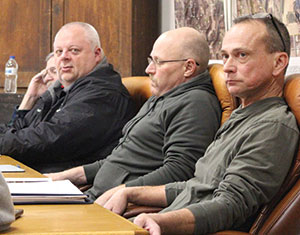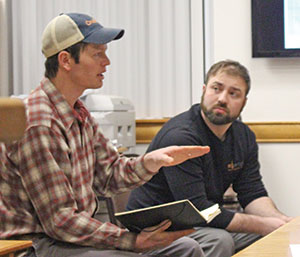The January 21 Rushford Village Council meeting was the first with new Mayor Dennis Overland at the helm. Longtime mayor Gordon Johnson resigned the position December 17. While the meeting served as the annual organizational meeting for the city, it also included more details on a proposed municipal land lease for a solar array.
The land lease is being proposed by solar entity OneEnergy, in cooperation with MiEnergy, for the purpose of constructing a 512 kilowatt ground-mount solar array. The lease term proposed is 25-years, for a 2.54-acre parcel, with the option to extend the lease up to an additional 10 years, providing the array is operating at a feasible level. While the city would not be able to end the contract at the end of the term, should that level is met, the city may sell the parcel to another private party. The OneEnergy contract would then be transferred to that property owner under the original terms.
The amount generated by the land lease is roughly $56,000 for the first 25 years, at $750 per acre, and near $78,000 should the contract be extended for 10 years following that. While the amount is lucrative to the city, the idea of tying up the land for the length of the term gave pause to several councilors.
Another option for the project is to construct a 488 kilowatt, non-tracking array entirely on existing MiEnergy land. However, the Village option would allow for a tracking unit providing 17-18% higher efficiency. Kent Whitcomb, MiEnergy Director of Member Services, and Eric Udelhofen, OneEnergy Renewables Director of Project Development, were present at the meeting to clarify the project scope.
“The survey has been done. This array would provide two million kilowatt hours per year, 210 homes or 400 electric cars for a year, to put it into scale,” noted Udelhofen. The output from the Village-owned parcel alone represents roughly one third of that total. “The team we’re planning to use for this work and other Fillmore/Winona County sites is from Minnesota and part of the growing solar workforce in the state. It’s family-supporting jobs that can’t be outsourced. That means a lot to us as we’re building these projects,” he continued.
The question of whether MiEnergy would be willing to buy the land outright was also considered. Two of the 10 property projects already done in the area were purchases rather than leases, according to Udelhofen. “Typically, the way it works, we pay more of a premium for the lease, but we’re definitely open to it.”
After some discussion it was determined the company couldn’t pay the Village the equivalent of what would be earned over a 25 year lease, but something closer to $40,000. However, the city could earn property tax if it was owned by a company or individual if it doesn’t meet exemption rules. It was also noted that the actual land value is not known at this time.
Originally, the parcel was bought with plans of a community park or business incubator facility. It was previously leased by Featherstone Farms until recently at rate of $350 per acre. “Maybe they would rent it for 25 years, but there’s no guarantee they’ll be there either,” noted Councilor Roger Knutson regarding the farm rent.
The direct monetary impact to Village residents would not come on a line item energy credit, but would result in lower electric rates for all area MiEnergy customers. Looking at the lease from a different perspective, Councilor Mike Ebner noted the annual lease amount would provide one quarter to one third of the city’s annual electric bill. “It would be a direct savings to Rushford Village residents if we apply money to our electric bill. It’s been asked here before what our residents would gain from this… this is what they’d gain, if you want to put it in terms.”
“We’re not trying to jerk you around, but it’s a long commitment,” added Knutson. It was requested that OneEnergy provide a land purchase option for the council to consider in comparison to the lease contract. The terms would then be structured to purchase after a year with the company paying in advance for the option to buy at that time or walking away from their down payment. The land purchase proposal option was expected January 22. The council opted to have continuation of the meeting for Monday, January 27, at 5:45 p.m., to discuss the purchase proposal.
During annual designations, rates, and contract renewals the council also discussed the Community Economic Development Associates (CEDA) contract. The most recent contract began December 2019 and is for one year. This year (2020) is the third contract year between the city and CEDA. Councilor Bob Hart, new to the council following the resignations of Councilor Rich Smith and Chad Rasmussen, questioned what the cooperative agreement between the city and CEDA provides.
“Perhaps we should sit down and have a workshop to review actual goals,” said Knutson. “They’re trying to tap into ability for grants and we’re hoping what we pay her comes back to us in grants.” The city doesn’t have the manpower to track down and apply for various grants. “We hope after a few years it comes back to us, but it needs to be reevaluated.”
“I agree 100%,” said Ebner. “We’re spending a lot of money and I’m not seeing much.” It was stated that they city is spending upwards of $13,000 for CEDA services annually. The first contract year saw private landowner identification and a meeting for potential economic development options for those parcels. The second year has been surveys for those landowners to determine potential residential development in addition to seeking of some grant funding for projects. “I understand the reservations and would like to see them run with it for another year, but would like them to understand how we feel on it.”
The next regularly scheduled council meeting is Tuesday, February 4, at 7 p.m., at Village Hall, while the discussion for the purposes of the solar array will be continued January 27. The public is encouraged to attend both.



Leave a Reply